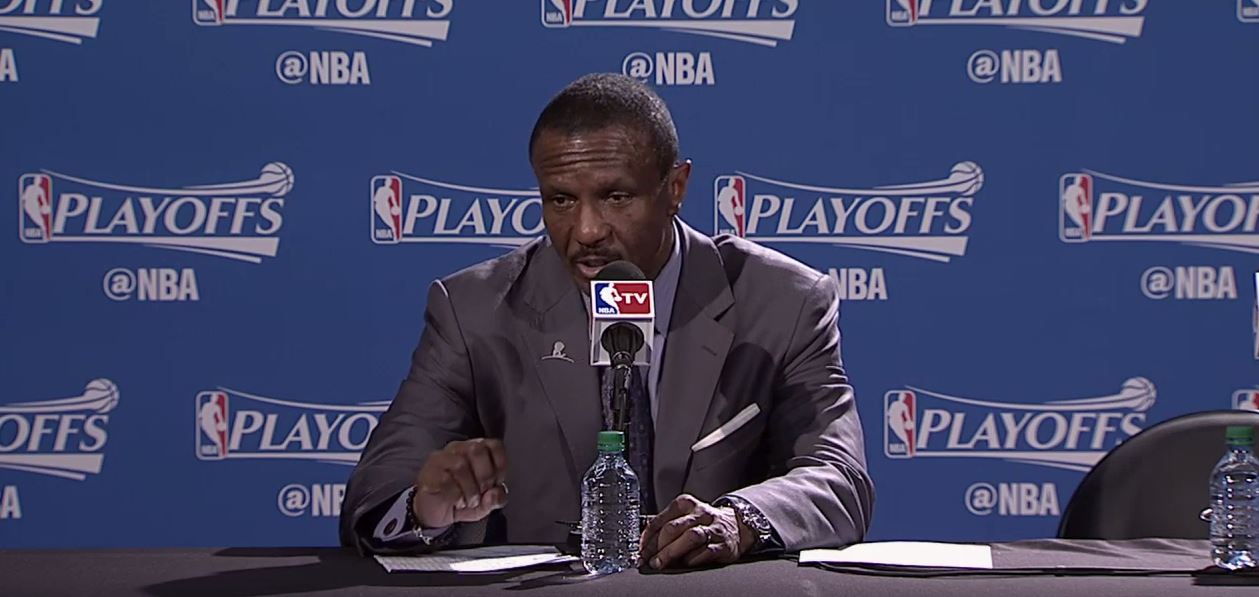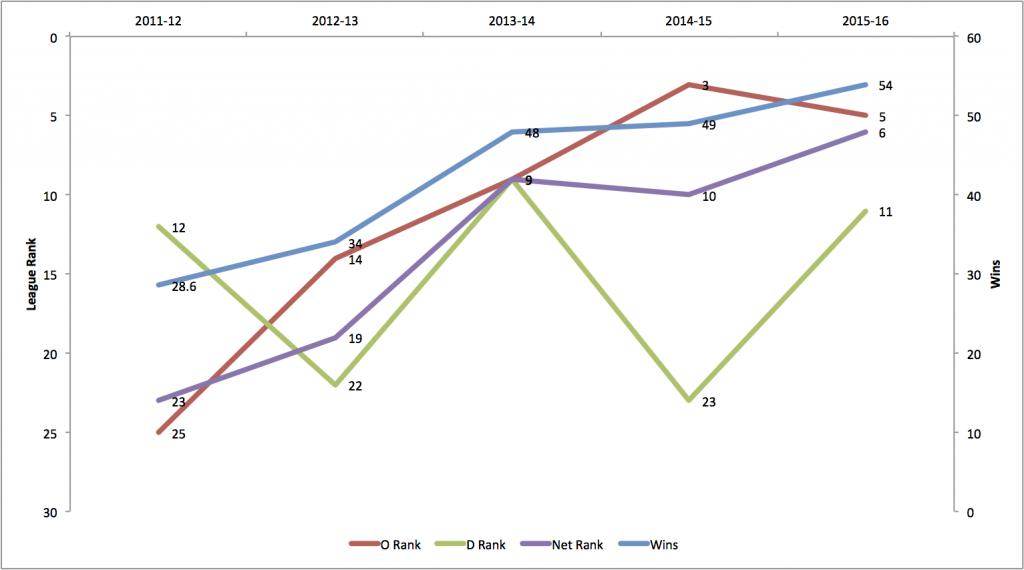The Toronto Raptors signed head coach Dwane Casey to a three-year contract extension, according to Adrian Wojnarowski of The Vertical. Dave Zarum of Sportsnet first had the news of an extension, with Wojnarowski coming through with the terms.
The deal will pay Casey $18 million, or $6 million annually, putting him a shade above the league average salary for a coach. There’s no mention of if Casey will take on a larger role within the organization’s power hierarchy, but it didn’t sound as if that was something he was interested in during his post-season media availability session, though coaches with a second title generally make more money. The dollar figure is perhaps a little less than expected given Casey’s recent track record, and considering the term is just three years. In other words, this seems like a pretty good deal for the Raptors’ side.
It’s also great for Casey, who won’t have to go through a third consecutive season as a lame-duck head coach. Rather than the team picking up their 2016-17 option on him and Casey hanging on without a deal once more, he now has three years of security. That’s important not just for him personally, but also because it continues the sense of stability around the team and its culture, and players can be fairly certain what and who they’re buying in to is there for the long haul. It also allows Casey and general manager Masai Ujiri to continue to build the team with a multi-termed approach, playing for both the now and down the line. Casey did better in recent seasons in developing young players while also serving a win-now edict, and the security should give him the incentive to continue to foster both ends.
The Raptors’ organization has spent the last three years working to develop an identity and a culture, and Casey’s been a large part of that. The players go to war for Casey, and to a man, there’s buy-in to the “role cards” he distributes. There’s rarely an instance of players not showing up or effort waning, and the locker room speaks incredibly highly of their leader. Those cultural aspects absolutely matter, as they’re paramount to managing through adversity like injuries or losing streaks or uncertainty, and Casey’s done a terrific job for several years now managing the team’s roles and personalities. The players are due credit, too, of course, but the Raptors’ brand of tough, physical, never-say-die fortitude starts with their head coach and might not be sustainable without him at the helm.
Casey’s also improved a great deal as a coach, particularly this season. When he was criticized in previous years, I was fond of pointing out that Casey managed the “macro” well (player management, a season-long game plan, general schemes) but struggled with the “micro” (strategic decisions, on-the-fly adjustments), and that most people seem to underrate the importance of the former and overstate the impact of the latter. Well, the latter became far less of an issue this season, as Casey proved far more flexible and inventive – the Raptors expanded their playbook, they ran fewer isolation plays by proportion, and Casey did things outside of his comfort zone (giving the reigns to Norman Powell, changing his starting lineup throughout the playoffs, benching DeMar DeRozan in a key juncture, and so on).
Part of that credit is owed to the staff Casey and Ujiri have put together, as Casey’s been given a great deal of high-end help. That’s not a knock on Casey, by any means. Humility is a skill in coaching, and the self-awareness and confidence to put talented people around you is a big part of managing the team (ask Steve Kerr, whose first act as Warriors coach was to load up his staff with talented assistants who could help). Next season could be a test for Casey, with assistants like Rex Kalamian (Houston, OKC, Washington), Andy Greer (Minnesota, New York), and Nick Nurse (any smart team) believed to at least be possible flight candidates. In the meantime, Casey’s staff remains one of the best and deepest in the league, and Casey’s extension is a nod to the great work of the entire group.
(Wojnarowski also notes that the team is working hard to retain the entire staff of assistants.)
Yes, there are still occasions on which Casey draws up a benign end-of-quarter play, proves a little too conservative, or is a little slow to adjust to something in-game. There was even speculation that a first-round loss to Indiana could cost Casey his job, something Ujiri more or less denied but would have made sense at least from a P.R. perspective, if not necessarily a basketball one. Casey is imperfect, and that’s fine, because he seems to recognize those imperfections and work on them. All coaches have shortcomings, and if you look at 30 team message boards on a given day, you might find 28 or 29 teams that want to fire their head coach (I exaggerate, but even Celtics fans grow angry at Brad Stevens from time to time). Casey does far more things well than poorly, and he’s continued to improve on his weaknesses, something even the players have made note of, which sets a pretty great example when he’s asking the same thing of them.
Not that such things should necessarily matter given the Raptors’ previously moribund history, but Casey is also the franchise’s all-time winningest coach, has been the coach for the team’s three best regular season records, and led them on their deepest playoff run ever. It would be a tough look to let him go after such a run, and with several top candidates already of the market and no clear successor who would at the same time be decidedly better, a fit for the roster and culture, and willing to come, those still pining for an upgrade may be pining for a strawman. Looking at the league-wide coaching carousel of the last few years, the grass is absolutely not always greener.
So sure it’s not always pretty. Toronto shouldn’t have needed seven games to beat Indiana, for example, and they maybe could have made quicker work of Miami. The team also made it six games in the Eastern Conference Finals while it’s two All-Stars struggled mightily from the floor for nearly two full rounds (pretty tough to hang on a coach), their beast of a starting center got hurt, and their defensive stopper was hobbled. They also won 56 games largely without the services of DeMarre Carroll, with Jonas Valanciunas missing a quarter of the season, and with a third of the roster originally committed to development projects. The defense improved from 23rd to 11th in the regular season while the offense remained a top-five attack, with Casey agreeing to overhaul his preferred defensive scheme and tweaking the offense so it involved a lot more passing (if not assists).
There’s still work to be done, to be sure. Casey can improve as a game-manager, he could lean on the variety of his playbook a bit more in clutch situations, and the offense as a whole could probably stand to be varied more, as much as the personnel – firmly “to be determined” right now – allows. The defense isn’t perfect yet, either, with the team needing to find a way to protect the 3-point line better while still sealing off the paint, the primary goal they mostly accomplished. There could be some heavy turnover again, too, depending on how certain free agents play out, and Casey will have to integrate new pieces and possibly develop another prospect in a win-now environment. These are all organizational objectives, ones Casey has mostly shown he’s up to the task of leading.
Perhaps most importantly, in a league where just five years at the helm makes Casey the fourth-longest tenured coach, stability is at a premium. In inking Casey to an extension, Ujiri has firmly erased the belief that Casey isn’t “his guy” since he inherited him three years ago. Casey is now Ujiri’s guy, he’s the Raptors’ guy, and the team is secure in its culture as it tries to take the next step in its development. Casey isn’t perfect, but there aren’t 30 or even 10 perfect coaches out there, and he’s been important to the team’s success and the way the organization wants to run. Those things matter just as much, and more, than a DeRozan pull-up from 18 feet after 16 seconds of dribbling out the clock at the end of the first half.




